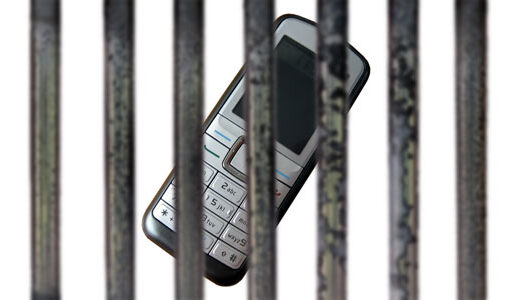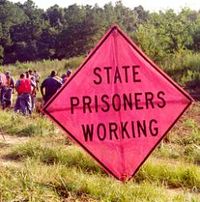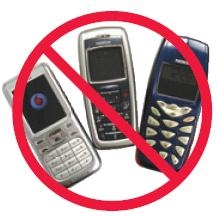 A bipartisan group of prison reformers is calling on the Federal Communications Commission to stop phone companies from charging inmates what they call unreasonable and predatory rates to make phone calls.
A bipartisan group of prison reformers is calling on the Federal Communications Commission to stop phone companies from charging inmates what they call unreasonable and predatory rates to make phone calls.
The letter is signed by conservative leaders such as Gary Bauer and David Keene, as well as civil rights groups such as The Leadership Conference on Civil and Human Rights, the NAACP, the National Council of La Raza, and the National Organization for Women.
As the letter states, “Healthy relationships with their families and other members of the community are the most important factor in prisoners’ successful return to their neighborhood. Maintaining the bonds of a family and support network is a very effective way to reduce recidivism among inmates, which is an important national goal…Yet, predatory phone rates discourage regular telephone contact with stable family members and others in the community.
Prisoners’ friends and families often provide the only opportunity incarcerated individuals will have to re-connect with a job and a support network that can prevent them from returning to prison. We need more people connecting to those in prison, not fewer. Sound public policy dictates that we should not disincentivize the very behavior that will help us keep families together and in turn reduce future crime.”
Why such astronomical fees? Phone companies often pay commissions to the state after they’ve won an exclusive contract to provide phone service at a state’s prisons. (All but eight states allow these exclusive contracts.) The phone companies then pass on the cost of paying the state to inmates and their families, who have to shell out as much as $17 for a 15-minute call, the group says. That can add up to $250 a month to call home for an hour each week—a cost that the often-poor families of inmates can hardly afford.
But the money also drives revenue to the country’s cash-strapped, crowded prison systems. In 2011, these phone company commissions generated $152 million in revenue for state prisons alone. In the federal system, which charges lower rates, the millions raised from commissions helps fund recreational and job-related activities for inmates, according to a Government Accountability Office report. (Source)
One strategy is to reduce the commissions, and therefore the cost of the telephone service, and offset this lost revenue by offering the new meshDETECT secure prison cell phone service. Many prisoners and their families would be willing to pay a premium to have the convenience and privacy a cell phone would provide their conversations. This will increase total revenues, reduce the contraband value of smuggled cell phones and offer more opportunities for prisoners to stay in touch with family and friends.
Here is the full text of the letter:
May 18, 2012
CAP INTERSTATE PRISON PHONE RATES
Chairman Julius Genachowski
Federal Communications Commission
445 12th Street, SW
Washington, DC 20554
RE: Docket No. 96-128, Petitioner Martha Wright et al., Alternative Rulemaking Proposal
Dear Chairman Genachowski:
We write to you as organizations and individuals that represent a wide variety of views on many issues, but that stand united on the need to reduce the exorbitant rates for telephone calls from prisons. Unreasonably high prison phone rates unjustly punish the families of people who are incarcerated, and contribute to rising recidivism rates by deterring regular telephone contact with family members and loved ones. Our diverse groups strongly believe that action on a petition that has been pending before the Federal Communications Commission since 2003 represents a critical opportunity for the Commission to exert its leadership in this area. Accordingly, we urge you to act quickly to address this problem by capping the charges that can be imposed for interstate prison phone calls.
As you are aware from the record that has been compiled at the FCC, the costs of telephone calls from incarcerated people are often extraordinarily high—well beyond what most people in our country pay for telephone service. It is cheaper to call Singapore at 12 cents a minute from a cell phone than it would be to speak to someone in prison in this country. A typical interstate collect call from a prison has a $3.95 connection fee (regardless of the length of the call), while rates per minute can be as high as almost 90 cents per minute. This can result in charges of $10-17 for a 15-minute collect call or $250 per month for a weekly one-hour call. Prisoners do not bear these costs; rather it is the family members and loved ones outside of prison who pay these extremely high rates.
The high rates are caused by the system used to procure telephone service at correctional institutions. Prisons request bids from competing telephone companies, requiring each bid to include the payment of a fee or commission to the prison in addition to the provision of telephone service. The costs of the calls are passed on to prisoners’ families in the form of higher telephone rates, while the prison reaps the benefit of the extra fees and commissions. Thus, prisons have every incentive to choose bids that maximize fees and maximize telephone rates—a clear “moral hazard.” While competition would be everyone’s first choice for constraining telephone prices, in this case consumers—prisoners and their families—have no voice in the selection of the carrier. The prison system that does select the carrier actually benefits from the higher rates, leaving the actual consumers as a literally captive market, unable to shop around for lower prices.
Healthy relationships with their families and other members of the community are the most important factor in prisoners’ successful return to their neighborhood. Maintaining the bonds of a family and support network is a very effective way to reduce recidivism among inmates, which is an important national goal. The rate of recidivism is at crisis levels in the U.S.; within three years of being released, 67 percent of ex-prisoners re-offend and 52 percent are re-incarcerated. Americans are paying dearly for this trend. According to the Pew Center on the States, state and federal spending on corrections has grown 400 percent over the past 20 years, from about $12 billion to about $60 billion. Yet, predatory phone rates discourage regular telephone contact with stable family members and others in the community.
Prisoners’ friends and families often provide the only opportunity incarcerated individuals will have to re-connect with a job and a support network that can prevent them from returning to prison. We need more people connecting to those in prison, not fewer. Sound public policy dictates that we should not disincentivize the very behavior that will help us keep families together and in turn reduce future crime.
It does not have to be this way. The U.S. Bureau of Prisons and several states that have rejected these commission payments charge reasonable rates and maintain superior levels of security. A recent study by the Government Accountability Office found that the Bureau of Prisons typically charged less than most state prison systems, yet continued to produce some profit for use by the prison, and also met its security objectives. To illustrate, the Bureau of Prisons charged 6 cents per minute for local calls and 23 cents per minute for long-distance calls, and generated $34 million in profits in 2010.[1]
In sum, the exorbitant rates paid by prisoners’ families increase recidivism, and place an undue and unfair burden upon the innocent. These spiraling costs are not attributable to security needs and cannot be corrected by a marketplace solution. As the only agency with jurisdiction over long distance rates, the Federal Communications Commission is the correct venue to resolve this problem. A firm stance by the Commission, along with recommendations that will help guide the state regulatory bodies with authority over local telephone rates, will provide a strong impetus to improve the situation at every level. Prisoners will be able to be in more frequent contact with their loved ones, and the public will be safer as a result.
For all the above reasons, we urge you to cap interstate prison phone call rates and take up the long-overdue task of protecting a vulnerable population from abusive practices. Thank you for your consideration.
Sincerely,
The Leadership Conference on Civil and Human Rights
ACLU
Rabbi Menachem Katz, The Aleph Institute*
David Keene, American Conservative Union*
Gary Bauer, American Values*
Asian American Justice Center
Chris Cannon, Cannon Industries, Inc.*
Center for Constitutional Rights
Center for Media Justice
Charles Hamilton Houston Institute for Race and Justice
The Constitution Project
Consumers Union
Tom McClusky, FRC Action*
Free Press
Human Rights Defense Center
International CURE
NAACP
Galen Carey, National Association of Evangelicals*
National Council of La Raza
National Hispanic Media Coalition
National Urban League
New America Foundation, Open Technology Initiative
NOW
PolicyLink
Prison Fellowship
Public Knowledge
Rev. Lou Sheldon and Andrea Lafferty, Traditional Values Coalition*
United Church of Christ, OC, Inc.
United Methodist Church, General Board of Church and Society
Washington Lawyers’ Committee for Civil Rights & Urban Affairs
*Institutional affiliation listed for identification purposes only.
- Blockchain System for Compliant Inmate Transactions - March 4, 2025
- Securus Gets the Signal, Eleven Years Later - August 23, 2024
- Multi-Blockchain System for Inmate Forensics - April 2, 2024




